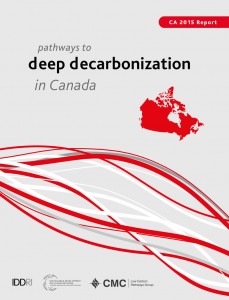 CALGARY, ALBERTA — A new study on decarbonization pathways shows that Canada can deeply reduce carbon emissions while maintaining a vibrant and prosperous economy.
CALGARY, ALBERTA — A new study on decarbonization pathways shows that Canada can deeply reduce carbon emissions while maintaining a vibrant and prosperous economy.
Difficult? Yes. Impossible? No, says Dave Sawyer, development director for CMC Research Institutes’ Low Carbon Pathways Group and co-author of the study outlining ways Canada can achieve the deep emission reductions science says are necessary to limit global temperatures to increases to just 2°C.
“It’s clearly a challenge,” says Sawyer, “This study helps to deconstruct that challenge and identify pathways that are resilient – that are our ‘no regret’ pathways.”
16-country report released in Paris
The Canadian study is part of a 16-country report released today in Paris by the United Nations Sustainable Development Solutions Network (UNSDSN) and the Institute for Sustainable Development and International Relations (IDDRI). The Deep Decarbonization Pathways Project will be tabled at the United Nations Climate Change Conference in Paris in December in an effort to focus conversation on achieving decarbonization in the next 35 years. The Canadian chapter was supported by CMC Research Institutes (CMC) and co-authored by Sawyer, Chris Bataille, associate researcher at IDDRI, and Noel Melton, partner at Navius Research.
The Canadian report, says CMC president Richard Adamson, is unique because it contains multiple carbon reduction scenarios using varied oil price developments.
Scenarios explore impacts of fluctuating oil prices
“Over the last year, events have pointed out the impact of oil prices on the entire economy. As a consequence, the current version of the report focuses on a series of scenarios exploring the impact of oil prices on future pathways to decarbonization,” says Adamson.
Whether oil prices are high or low – scenarios show that the Canadian economy could benefit by developing and exporting low carbon technologies while reducing the cyclical impacts of global oil price shocks.
“The Canadian report is oriented to help a range of interested parties think about long term decarbonization and how to make the transition to a low carbon future such that we minimize costs and prepare ourselves to take advantage of an exploding low carbon export market,” says Sawyer.
Competitive advantages for Canada
Similar decarbonization trends were identified in the reports of all 16 countries. These focus on decarbonizing electricity and industrial processes, energy efficiency improvements in buildings and transportation, moving to non-food crop biofuels for freight transportation, and reducing and using non-energy sector emissions such as the methane emitted from landfills.
Canada has huge competitive advantages in decarbonization, says Bataille. “We have an enormous pan Canadian storehouse of renewable energy and one of the largest, most usable capacities in the world for the geological storage of carbon in the world.”
Sawyer says that globally, advances are being made to reduce carbon emissions in vehicles, electricity production and buildings. “Where we run into challenges, or where the world runs into challenges, is cost effectively decarbonizing industry and primary extraction.”
Challenges and opportunities
Within that challenge is also an opportunity because countries that rapidly develop low carbon technologies will be able to export those solutions. There will be a large export market for these technologies – over 90% of Canada’s export business is conducted with countries moving toward decarbonizing their economies.
“Clearly there’s a significant growth opportunity here,” says Sawyer. “The global market for low carbon goods and services presents a massive opportunity for Canadian companies and Canadian technologies.”
Bataille agrees. “Decarbonizing heavy industry and primary extraction is a once in a century opportunity to use our strong science, engineering and manufacturing base, even our low dollar, to create exportable products that can be used worldwide.”
Stronger innovation signals needed
Canada’s decarbonization efforts are moving forward on a number of fronts and, say the report’s authors, but both the oil and gas and heavy industry sectors need much stronger innovation signals to stimulate development.
“The real challenge is an expectation problem. We need credible policy at all levels of government to signal that carbon will be more expensive and will need to be managed. This will drive innovation across Canada’s entire economy and prepare Canada to excel in a decarbonizing world,” says Sawyer.
Media contact: Ruth Klinkhammer, Senior Manager, Communications, 403-210-7879, ruth.klinkhammer@cmcghg.com